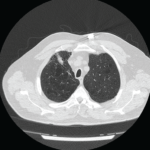How might these mutations link mechanistically with autoimmune disease? Faulty protein trafficking by mutant COPA resulted in cellular stress and upregulation of cytokines that triggered a Th17 response. The investigators proposed that such an impairment in cellular trafficking may cause these misfolded proteins to be mistakenly released and, due to their cryptic nature, trigger an autoimmune response.
Although my patient and all of her affected relatives were female, family pedigree analysis of the entire cohort suggested instead a pattern of autosomal dominant inheritance with incomplete penetrance. Thus, lacking any clues in the family history, might we fail to identify similar patients who are already under our care?
CCP & the Lungs
Although RF was observed in the blood samples of nearly half of the patients studied, the absence of CCP antibody is one clue that distinguishes this form of symmetric inflammatory polyarthritis from RA. The concept that CCP antibodies may originate in the lungs has become one of the hottest topics in RA research.
The story of RA originating in the lungs began decades earlier when a seminal study of Welsh coal miners led by a pulmonologist, Anthony Caplan, MD, identified a syndrome characterized by large, mostly peripheral pulmonary nodules, interstitial fibrosis and the presence of RF. Although many of these miners had arthritis, others developed RA years later, suggesting that the lungs might serve as an incubator for this disease.5
Fast forward about a half a century to when the concept of pre-clinical RA—a stage when individuals show heightened levels of citrullinated antibodies yet lack clinical arthritis—emerged.6 Instead of inhaling silica dust as coal miners did, some cigarette smoking patients were found to generate high levels of anti-citrullinated protein antibodies (ACPA), thus raising their risk for developing RA (see “Air Pollution: Is There an Association with Rheumatic Disease?” The Rheumatologist, December 2015).
Perhaps we ought to view the lungs as another mucosal surface, in addition to the oral cavity and the gut, that is capable of inducing immune dysregulation in RA. If so, could bronchiectasis, with its predilection for chronic bacterial infection and the development of RF and ACPA, serve as an incubator for the pathogenesis of RA?
A British study of patients with bronchiectasis, some of whom also had RA, observed that those without arthritis often had raised ACPA response, which were not citrulline specific; however, in patients with bronchiectasis who later developed RA, citrulline specificity became a hallmark feature of their breakdown in immune tolerance.7


